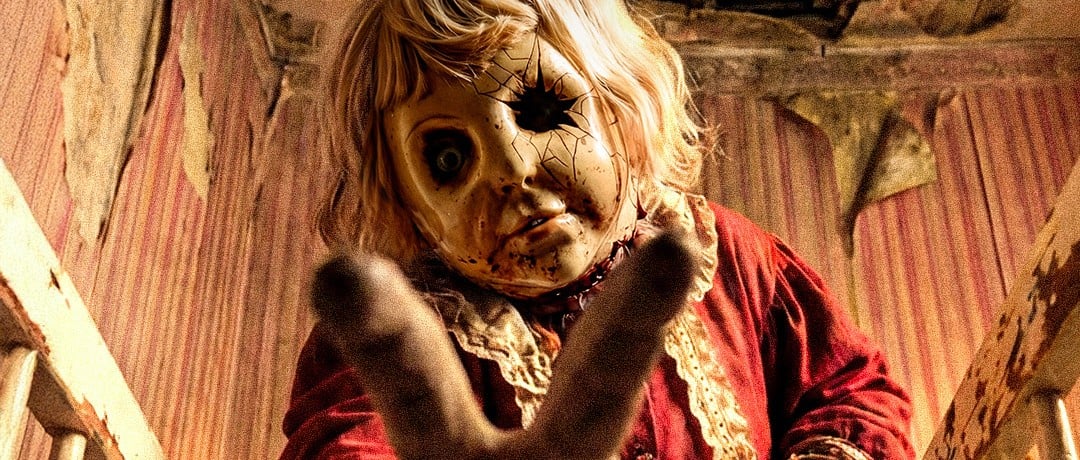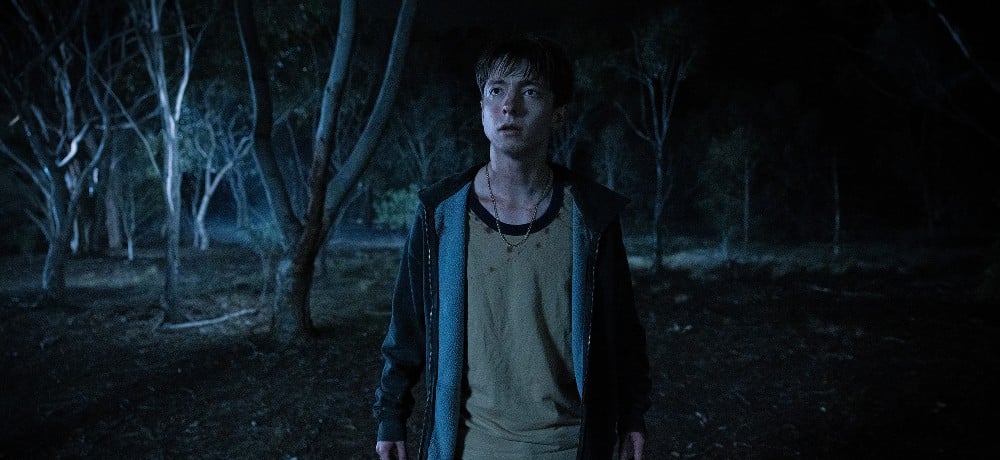





Luz has been hitting the festival circuit, and if it’s playing in a theater anywhere near you, make the trip to see it. This is an unconventional horror movie that demands the full attention of its audience, and requires a big screen and surround sound experience. The movie will be making its US premiere at Fantastic Fest, but I recently had a chance to see it at Fantasia and caught up with writer/director Tilman Singer to talk about this impressive possession movie:
Taking on a demonic possession movie is always risky because everyone likes to compare it to The Exorcist and many filmmakers just try to do what we’ve seen in The Exorcist. With Luz, you’ve done something completely different. Can you talk about how you approached the material, knowing that this is a tough subgenre to crack?
Tilman Singer: I think the most important aspect of this is that the genre didn't come first. It wasn't about making a demonic possession movie first; it just fit perfectly into my frame. So, the first thing I had in my head was that interrogation setting—somebody being questioned and that person is reliving an event from the day before at the same evening, and we hear what the person has been experiencing.
With my research, I [discovered more about] hypnosis and interrogation, or questioning under hypnosis, which is kind of bullshit because it's so suggestive and you cannot get the truth out of anybody that's been put under trance. Everything that you suggest to them, they will say.
So, I thought that was a great tool for an evil source and with that came about [the idea of] a supernatural antagonist. It makes it a good story of a Colombian wife and her past, and a Catholic school for girls. That's how I got Luz's story. Hypnosis is creepy anyways, but then, when I have the chance to put everything in sound, yeah, it's a spirit.
I really love a lot of the audio and visual choices that you made. You shot on 16mm, right?
Tilman Singer: Oh, yeah. I love shooting on film. I like the look of it, the feel of it, but much more than that, I love the way you have to shoot, the way you have to prepare, the way you have to be disciplined. And the way you set up the shots, rehearse, and then in our case we had three takes, tops, per shot, because we didn't have more money. So, a lot of that ’70s feel, that old-style approach, comes from us not shooting digital and running around and covering everything. I wasn't going for nostalgia intentionally; it kind of came with the process. At the same time, I'm watching old movies all the time. I think a lot of my decisions might be old school, because they're just my normal way of thinking about how to shoot, or how to stylize it.
This movie is very demanding of the actors. Almost everyone, except the guy at reception, is put through the wringer. Can you talk about working with the cast?
Tilman Singer: Yeah, I was really happy to find them. I think they're amazing. Most of them are mostly theater actors. They did TV and some movies, but mostly they work in theater, so whenever they're on set, especially a set like this, it's something completely new for them. A lot of our relationship and work was really based on trust. They trusted me. They really liked the script and they completely trusted me from the talks we had before. At the same time, I gave them a lot of freedom to have their approach to acting in the film.
For example, a lot of them have dialect or specific German accents. They could have got rid of them, but I like to hear this one person's from Berlin, this one is from Austria. And when she speaks Spanish, she speaks it with the thickest Austrian accent, but I love that. At some times, it was hard for them, but mostly I thought it took a lot of pressure off of them. I always let the actors be part of the whole scene creation. So, I tell them what kind of shot [it is], how they're being framed. I tell them how I'm going to edit it, and maybe if I know how the music's going to work, I always let them know to get them using my headspace. So, it's like we're making the movie together.
Can you talk a little bit about your choices with the sound design? There’s such a hypnotic quality to this movie and the sound choices play a huge part in that.
Tilman Singer: The main aspect of the hypnotic quality is disorientation for the audience. We know this is only a couple of hours, but it's being told [in a] very convoluted [way] with a backstory that you don't really understand when you first watch [it]. The sound obviously is very important and it was written out in the script like this: I wrote every line like, “Now you hear this, now you see this, now you hear this, now this is gone, now you don't see it anymore.” That was horrible to read, of course, but it was a very technical script where everybody could know the productions, and could say, “This has to be there now, this doesn't have to be there. “
Sound obviously is very, very important for the film. That was my idea very early on, and so we really tried to do something different for the final mix when music and sound come together. Our idea was, the main idea, my favorite of our ideas was to have the sound technician, or interpreter or whoever sit in the back. He sits in the back and he's talking to you from the back. That's such a weird, creepy, almost performance, installation art thing, that you as an audience member have to get over, because we're not used to hearing conversation from the surroundings. This is only for "swooshes" and for cars going by, usually. It shouldn't be, but it is. And so all of this puts you a little bit more into the movie and lets you immerse yourself in it.
What has your experience been like showing this to a crowd and seeing reactions, in person and on social media?
Tilman Singer: Honestly, it's been overwhelming. It's fantastic. People really love it. I need some time to maybe step back and really appreciate it. But, it's fantastic. Whenever I sit in the theater and watch it with an audience, I like it. Even at genre film festivals, when people are usually very loud and yell stuff, the audience kept super quiet [for Luz]. They really sit down, and then it's over, and I see a lot of people stay for the Q&A, and I can see on their faces that they're a little bit confused. But, they're there, and they’re saying, "Okay, what did I just see? Let's talk about it."
---------
Check here to keep up to date on all of our coverage of the 2018 Fantasia Film Festival!